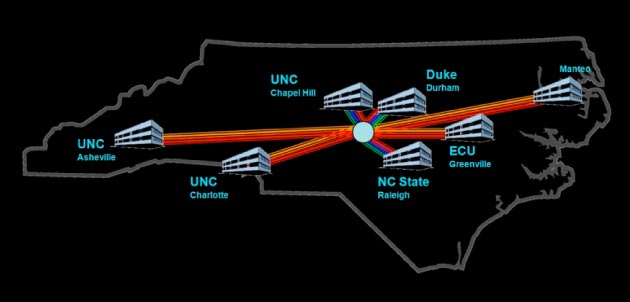Over the past three years, RENCI has evolved into a statewide organization that spans six North Carolina campuses and affiliated institutes and 27 facilities in seven regions across the state.
Each region includes interconnected advanced visualization systems best suited to its research and practical problem solving activities. All are linked together through high-speed research networks, and all can share data and software applications and collaborate in real time and in high definition.
The connected RENCI engagement and visualization centers represent the largest coordinated distributed statewide visualization effort in the nation. They are a component of RENCI’s advanced cyberinfrastructures to support research and practical problem solving, which includes high performance computers, data storage, software libraries and experimental networks as well as visualization systems.
Taken together, the RENCI locales also comprise the RENCI Virtual Organization Data Grid, a set of linked data hubs managed by iRODS—the integrated Rule Oriented Data System developed by RENCI’s close collaborators and science team members the Data Intensive Cyber Environments (DICE) group at UNC Chapel Hill. The RENCI Data Grid houses RENCI visualization files, the data on which the visualizations are based and the visual analytics software tools that enable many additional levels of insight. When fully deployed, the RENCI Data Grid will make data resources and analysis tools available to North Carolina universities, businesses and government.
“Our distributed visualization centers are more than places where researchers can go to use advanced visualization systems, and they are more than centers where you can communicate with colleagues at remote sites,” says Ray Idaszak, RENCI’s director of visualization and engagement. “We are putting in place an integrated system for visualizing data and using data for discovery and innovation. One of the most exciting aspects of putting together this virtual organization is exploring how our distributed environments change how people work together over long distances. What we are developing is not just a system of telepresence or data sharing. We are creating new definitions of working together and of place.”
For example, the RENCI engagement center at UNC Chapel Hill includes a 3D stereoscopic teleimmersion room, where researchers can view 3D animations and scientific visualizations at four times the resolution of high definition. Exploratory videoconferencing in the room involves generating 3D images of participants and 3D depictions of images of mutual interest—say, the CAD design of a building—superimposed on the scene. Users share control of, and interaction with, the shared images, creating a new type of interaction not possible in the physical world.
Two floors down from the Teleimmersion Room, the RENCI Social Computing Room with its floor-to-ceiling, 360-degree desktop allows real people in the room to interact with avatars in virtual worlds on the life-size desktop. The setup allowed the UNC School of Law to hold a mock trial—routine events for third-year law students—in the virtual world of Second Life, with some jurors, lawyers and audience members participating as avatars in the virtual world and others as plain old people in the “real” world.
For more on RENCI’s virtual organization and distribute visualization systems, see RENCI VO nodes. For a tour of the Situation Room at RENCI at UNC Charlotte, a RENCI virtual organization node, watch the video below RENCI Situation Room.
About RENCI
RENCI (the Renaissance Computing Institute) applies advanced technology resources and expertise to problems identified by the state of North Carolina and to university research initiatives. Its research contributes to the development of the next generation of technology infrastructure and cyber tools. Founded in 2004 as a major collaboration involving UNC Chapel Hill, Duke University and North Carolina State University, RENCI is a statewide virtual organization with facilities at campuses across North Carolina.
For more see http://www.renci.org.



